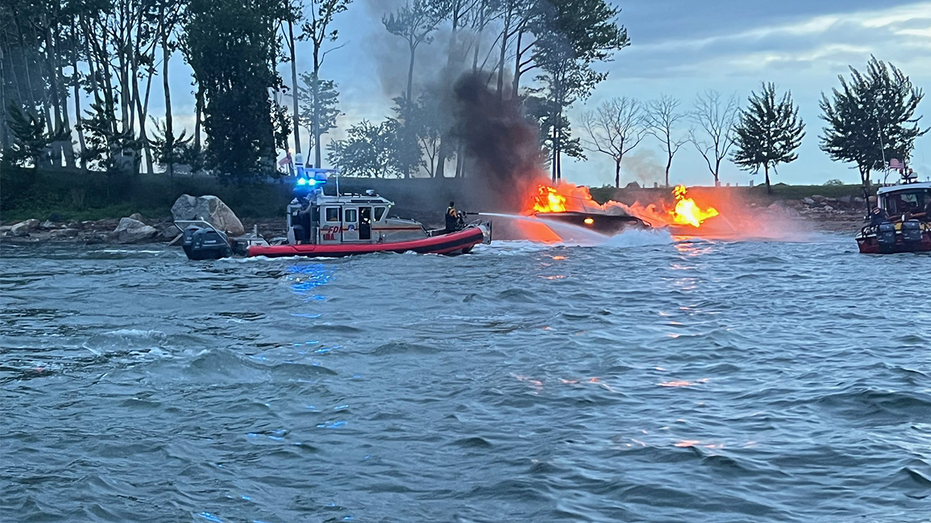In a harrowing incident that unfolded in New York, more than 20 individuals sustained injuries after a boat caught fire, leading to chaos on the water. The event has not only raised serious concerns regarding safety on recreational vessels but has also resulted in legal action against the captain of the boat, who has been charged with Driving While Intoxicated (DWI).
The boat, which was carrying a group of passengers for a leisure cruise, erupted in flames while navigating through the waters. Eyewitnesses described a scene of panic as flames and thick smoke billowed from the vessel, prompting the immediate response of emergency services. Passengers, many of whom were enjoying a day out on the water, quickly found themselves in a life-threatening situation.
According to reports from local authorities, the fire broke out unexpectedly. Witnesses reported hearing loud explosions followed by the swift spread of flames, which engulfed a significant portion of the vessel. Many passengers leaped overboard in an effort to escape the intense heat and smoke, while others clamored for help as they waited on emergency boats to arrive.
Emergency responders arrived on the scene within minutes of the fire’s breakout. They used firefighting boats to combat the blaze and rescue those trapped on the burning vessel. The quick actions of the nearby coast guard and local fire departments were instrumental in preventing a more tragic outcome. Passengers were taken to various nearby hospitals for evaluation and treatment of their injuries, which ranged from minor burns to smoke inhalation.
The captain’s behavior prior to the incident has come under scrutiny. Following the extinguishing of the fire and the rescue operations, authorities conducted a sobriety checkpoint for the captain. It was determined that the captain was driving under the influence, leading to the subsequent DWI charges.
Authorities state that the investigation into the incident is ongoing, and they are working to determine the specific causes of the fire. They are analyzing the boat’s mechanical systems, looking into safety protocols, and reviewing the captain’s credentials and experience. It is of utmost importance for officials to ascertain whether proper safety measures were followed, especially considering the high number of injuries reported.
This tragic incident comes as a reminder of the inherent risks associated with boating, particularly during busy seasons when recreational watercraft are more frequently used. State and local officials are emphasizing the need for stringent adherence to safety regulations. Awareness campaigns and safety training programs for boat operators are also being advocated to prevent such accidents in the future.
Boating safety advocates have expressed concern over the rising number of accidents related to intoxicated operators. They urge both boaters and passengers to stay vigilant, avoid alcohol consumption, and adhere to boating safety standards. Many have highlighted that education on safety and awareness could significantly reduce the likelihood of similar incidents.
In the aftermath of the fire, many of the injured passengers are grappling with the psychological effects of the event. Survivors have described feelings of shock, confusion, and anxiety stemming from their experience. Support services are being made available to those affected, as mental wellness is just as critical as physical health following such traumatic incidents.
The ramifications of this incident extend beyond just the immediate injuries and damages. Legal experts suggest that those injured may seek compensation from various parties, including the boat company, the captain, and possibly others involved in maintaining the vessel. While lawsuits can take time to resolve, they may ultimately serve as essential means for victims to seek accountability and compensation for their medical bills, pain and suffering, and lost wages.
The boating community has reacted strongly to this event, expressing outrage and sadness for those affected. Many local boaters have come together, sharing their own personal stories and urging for safer boating practices. Community forums and discussions are being organized to address the need for more robust measures aimed at protecting both operators and passengers.
Looking ahead, it remains crucial for boating enthusiasts and industry leaders to evaluate existing safety protocols and consider potential reforms. The involvement of stakeholders, ranging from regulatory bodies to local governments, is vital to shape effective policies aimed at curtailing boating accidents.
As the investigation continues, residents and boating enthusiasts alike are left to contemplate the implications of this incident. Public safety officials are urging anyone with information about the event, or those who may have been involved, to come forward and assist in the ongoing investigation.
In a time where recreational boating opportunities should be about enjoying nature and spending quality time with friends and family, this incident has cast a shadow over those experiences, highlighting the need for greater accountability and vigilance on the waterways. As authorities work to understand the root causes of the fire and the circumstances leading to the captain’s intoxication, the boating community hopes for a future where these types of catastrophic events can be prevented.
As news of the incident spreads, it is clear that many are calling for improved education, stricter penalties for those who operate vessels while under the influence, and more comprehensive safety training programs for boat operators. Ensuring the safety of all passengers should be the top priority in an industry where many aspects remain largely unregulated and self-monitored.
In conclusion, the boat fire incident in New York serves as a stark reminder of the importance of safety on the water. With over 20 individuals injured and the captain facing serious legal consequences, the boating community is called to action to review and reform practices in order to prevent future tragedies. Passengers and operators alike must remember: safety should always come first when participating in recreational boating activities.
































